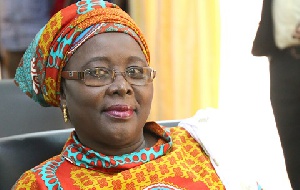 Hajia Alima Mahama, Minister for Local Government and Rural Development
Hajia Alima Mahama, Minister for Local Government and Rural Development
The Tema Metropolitan Chief Executive, Felix Mensah Nii Anang-La, has stated that some of the Metropolitan, Municipal and District Assemblies (MMDAs), including the TMA, can survive without government support.
His assertion was in agreement with the Citi Breakfast Show discussion on Tuesday, spearheaded by Host Bernard Avle, which advocated the need for government to reduce or in some case cut subventions to MMDAs to enable them generate their own revenue for the needed development.
The Citi CBS discussants were of the view that when this happens, government can then spend such monies to develop the rural parts of Ghana in less-endowed assemblies by providing them with basic amenities.
Bernard Avle, who made the proposals ahead of the 2018 budget statement to be delivered on November 15, 2017, made a direct appeal to the Finance Minister Ken Ofori-Atta, to consider these proposals in order to wean the country from aid and loans.
Most of the MMDAs depend on some statutory funds especially the District Assemblies Common Fund (DACF) to undertake development projects within the local assemblies.
The government releases to the assemblies often delay for several months before they are released.
Regardless of these amounts, assemblies also rely on internally generated funds, amount many believe should be enough to adequately cater for assemblies’ needs if loopholes are blocked and proper tax systems are in place.
Speaking on the Citi Breakfast Show on Tuesday, the Tema MCE agreed that they can do without full government support if adequate measures are put in place to beef up internal mobilization of revenue.
He noted that the funds they generate internally are even more than what they receive from government.
“In Tema, our IGF is always more than what we get from common fund. It has never been a case where common fund will be bigger than IGF. It is about four times what we receive from common fund,” he said.
When asked by show host, Bernard Avle whether the Tema Metropolitan Assembly would be able to raise enough money to undertake development projects without receiving DACF, Mr. Anang-La said “sure, we can do that.”
The MCE said his outfit makes a lot from property rates, business operating permits, sewerage permits among others.
“There are a lot of [revenue] leakages that we are putting measures in place to get them blocked.”
“We in TMA have decided to go in for a private consultant who is going to work in close relation with our engineers so that we do property-rate checks. Even normal permits, some people find ways and means to pay less than they ought to. All these are draining the assembly. Even those who are paying are paying less than they ought to. The property rates, business operating permits and the money that we receive from our sewerage permit. Always, the business operating permits give us more,” he added.
Awutu Senya East can also survive
Alhaji Danaa, an Assembly member for Iron City in the Awutu Senya East District in the Central Region, who also shared his views on the Citi Breakfast Show, attested to the fact that the districts could make it without the support of government.
He is of the view that this would be achieved if revenue loopholes are blocked.
He however advised that “if the government will put in the measures that will prevent revenue collectors from stealing the money, all what I can say is that we can only make it at the assembly level. The government will get huge sums of money if they are able to put a stop to all these things.”